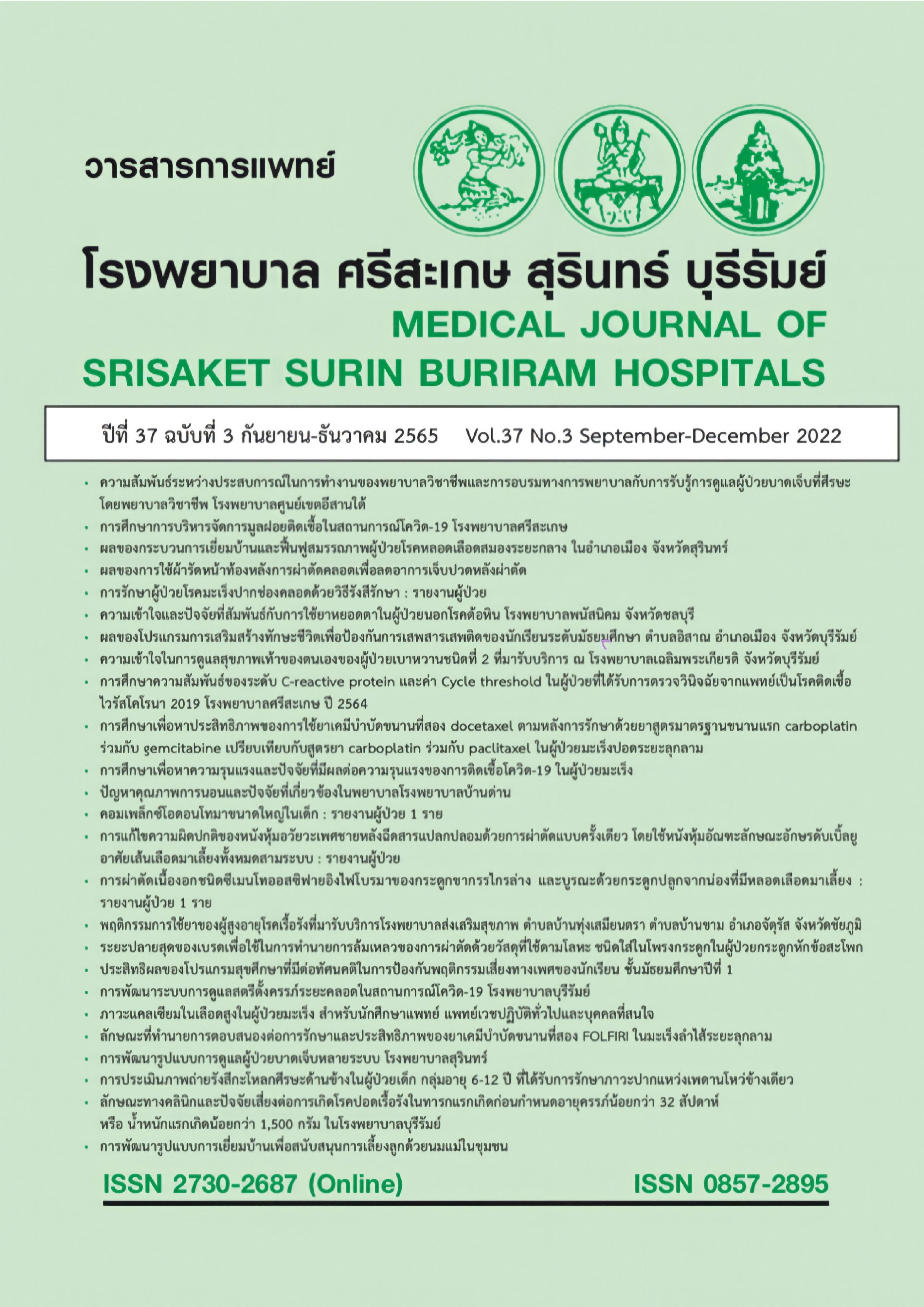ลักษณะที่ทำนายการตอบสนองต่อการรักษาและประสิทธิภาพของยาเคมีบำบัดขนานที่สอง FOLFIRI ในมะเร็งลำไส้ระยะลุกลาม
Main Article Content
บทคัดย่อ
หลักการและเหตุผล: มะเร็งลำไส้เป็นมะเร็งที่พบเป็นลำดับต้นและเป็นสาเหตุสำคัญของการเสียชีวิต การรักษาหลักของมะเร็งลำไส้ระยะลุกลามในปัจจุบันยังคงเป็นยาเคมีบำบัด แต่ผู้ป่วยที่ได้รับยาเคมีบำบัดขนานที่สอง มักมีร่างกายที่ทรุดโทรมลงเนื่องจากโรคลุกลามมากขึ้นร่วมกับเคยผ่านการรับยาเคมีบำบัดมาแล้วและอาจมีผลข้างเคียงจากยา รวมถึงมีการตอบสนองของยาลดลง ดังนั้นหากทราบลักษณะทางคลินิกและปัจจัยตอบสนองต่อยาเคมีบำบัดขนานที่สอง จะช่วยสร้างความมั่นใจในการคัดเลือกผู้ป่วยเพื่อรับยาเคมีบำบัด และศึกษาประสิทธิภาพของยา เพื่อให้การรักษามีประโยชน์สูงสุดต่อผู้ป่วย
วัตถุประสงค์: เพื่อศึกษาลักษณะทางคลินิกและปัจจัยทำนายการตอบสนองต่อยาเคมีบำบัดขนานที่สองสูตร FOLFIRI ในการรักษามะเร็งลำไส้ระยะลุกลาม รวมถึงศึกษาประสิทธิภาพของยา FOLFIRI ได้แก่ ระยะโรคสงบ หรือ progression free survival (PFS) กับระยะเวลารอดชีพ หรือ overall survival (OS)
รูปแบบการศึกษา: การศึกษาแบบย้อนหลังโดยเปรียบเทียบประชากรสองกลุ่มเชิงวิเคราะห์
วิธีการศึกษา: รวบรวมข้อมูลผู้ป่วยในโรงพยาบาลสุรินทร์ที่ได้รับการวินิจฉัยว่าเป็นมะเร็งลำไส้ระยะลุกลาม ซึ่งมีผลการตรวจชิ้นเนื้อทางพยาธิวิทยายืนยัน ได้รับการวินิจฉัยตั้งแต่วันที่ 1 มกราคม พ.ศ. 2556 ถึง 30 มิถุนายน พ.ศ. 2565 จากฐานข้อมูลทางอิเล็กทรอนิกส์ โดยผู้ป่วยต้องได้รับยาเคมีบำบัดมาแล้ว 1 ขนาน คือ FOLFOX เพื่อศึกษาปัจจัยทางคลินิกและการตรวจทางห้องปฏิบัติการกับการตอบสนองต่อยาเคมีบำบัด รวมถึงศึกษาประสิทธิภาพของยา สูตร FOLFIRI เมื่อใช้เป็นยาขนานที่สอง
ผลการศึกษา: ผู้ป่วยมะเร็งลำไส้ระยะลุกลาม ได้รับยาเคมีบำบัดขนานที่สองคือ FOLFIRI จำนวน 204 คน แบ่งเป็นกลุ่มที่ตอบสนองต่อยา 54 คน (ร้อยละ 26.5) และกลุ่มที่ไม่ตอบสนองต่อยา 150 คน (ร้อยละ 73.5) พบว่าลักษณะที่มีผลต่อการตอบสนองต่อยาเคมีบำบัด ได้แก่ body mass index (BMI) ≥18.5 kg/m2 (OR=6.62, 95%CI: 1.46-29.91, p=0.014), hemoglobin (Hb) ≥13 g/dl (OR=4.04, 95%CI: 1.27-12.83, p=0.018), first line response (CR/PR) (OR=3.80, 95%CI:1.58-9.12, p=0.003) และ lymphovascular invasion (LVI) positive (OR=2.40, 95%CI: 1.14-5.07, p=0.021) สำหรับระยะเวลาโรคสงบ (PFS) กลุ่มที่ตอบสนองต่อยา คือ 8.8 เดือน และกลุ่มที่ไม่ตอบสนองต่อยาคือ 3.3 เดือน โดยค่ากลางของ PFS ทั้งสองกลุ่มเป็น 4.1 เดือน (hazard ratio [HR], 0.39; 95% CI, 0.28-0.54; p<0.001) ส่วนระยะเวลารอดชีพ (OS) กลุ่มที่ตอบสนองต่อยา คือ 30.9 เดือน และกลุ่มที่ไม่ตอบสนองต่อยาคือ 22.6 เดือน ค่ากลางของ OS ทั้งสองกลุ่มเป็น 23.9 เดือน (HR, 0.42; 95%CI, 0.24-0.74; p=0.003)
สรุป: ลักษณะที่มีผลต่อการตอบสนองต่อยาเคมีบำบัดขนานที่สอง FOLFIRI ในผู้ป่วยมะเร็งลำไส้ระยะลุกลาม ได้แก่ BMI ≥18.5 kg/m2, Hb ≥13 g/dl, first line response (CR/PR) และ LVI positive หากพบลักษณะที่ทำนายการตอบสนองต่อยาเคมีบำบัด จะช่วยให้มีผลลัพธ์ที่ดีขึ้นขณะเข้ารับการรักษา ส่วนประสิทธิภาพของยา FOLFIRI หากมีการตอบสนองต่อยาเคมีบำบัดจะส่งผลให้มีระยะเวลาโรคสงบและระยะเวลารอดชีพที่ดีขึ้น
Article Details

อนุญาตภายใต้เงื่อนไข Creative Commons Attribution-NonCommercial-NoDerivatives 4.0 International License.
เอกสารอ้างอิง
National Insamran W, Sangrajrang S. Cancer Control Program of Thailand. Asian Pac J Cancer Prev 2020;21(3):577-82. doi: 10.31557/APJCP.2020.21.3.577.
Meyerhardt JA, Mayer RJ. Systemic therapy for colorectal cancer. N Engl J Med 2005;352(5):476-87. doi: 10.1056/NEJMra040958.
Tournigand C, André T, Achille E, Lledo G, Flesh M, Mery-Mignard D, et al. FOLFIRI followed by FOLFOX6 or the reverse sequence in advanced colorectal cancer: a randomized GERCOR study. J Clin Oncol 2004;22(2):229-37. doi: 10.1200/JCO.2004.05.113
Goldberg RM, Sargent DJ, Morton RF, Fuchs CS, Ramanathan RK, Williamson SK, et al. A randomized controlled trial of fluorouracil plus leucovorin, irinotecan, and oxaliplatin combinations in patients with previously untreated metastatic colorectal cancer. J Clin Oncol 2004;22(1):23-30. doi: 10.1200/JCO.2004.09.046.
Seymour MT. Fluorouracil, oxaliplatin and CPT-11 (irinotecan), use and sequencing (MRC FOCUS): A 2135-patient randomized trial in advanced colorectal cancer (ACRC)
J Clin Oncol 2005;23(16_suppl):3518. DOI:10.1200/JCO.2005.23.16_SUPPL.3518.
Giantonio BJ, Catalano PJ, Meropol NJ, O'Dwyer PJ, Mitchell EP, Alberts SR, et al. Bevacizumab in combination with oxaliplatin, fluorouracil, and leucovorin (FOLFOX4) for previously treated metastatic colorectal cancer: results from the Eastern Cooperative Oncology Group Study E3200. J Clin Oncol 2007;25(12):1539-44. doi: 10.1200/JCO.2006.09.6305.
Peeters M, Price TJ, Cervantes A, Sobrero AF, Ducreux M, Hotko Y, et al. Randomized phase III study of panitumumab with fluorouracil, leucovorin, and irinotecan (FOLFIRI) compared with FOLFIRI alone as second-line treatment in patients with metastatic colorectal cancer. J Clin Oncol 2010;28(31):4706-13. doi: 10.1200/JCO.2009.27.6055.
Sobrero AF, Maurel J, Fehrenbacher L, Scheithauer W, Abubakr YA, Lutz MP, et al. EPIC: phase III trial of cetuximab plus irinotecan after fluoropyrimidine and oxaliplatin failure in patients with metastatic colorectal cancer. J Clin Oncol 2008;26(14):2311-9. doi: 10.1200/JCO.2007.13.1193.
André T, Louvet C, Maindrault-Goebel F, Couteau C, Mabro M, Lotz JP, et al. CPT-11 (irinotecan) addition to bimonthly, high-dose leucovorin and bolus and continuous-infusion 5-fluorouracil (FOLFIRI) for pretreated metastatic colorectal cancer. GERCOR. Eur J Cancer 1999;35(9):1343-7. doi: 10.1016/s0959-8049(99)00150-1.
Mabro M, Artru P, André T, Flesch M, Maindrault-Goebel F, Landi B, et al. A phase II study of FOLFIRI-3 (double infusion of irinotecan combined with LV5FU) after FOLFOX in advanced colorectal cancer patients. Br J Cancer 2006;94(9):1287-92. doi: 10.1038/sj.bjc.6603095.
Shitara K, Matsuo K, Yokota T, Takahari D, Shibata T, Ura T, et al. Prognostic factors for metastatic colorectal cancer patients undergoing irinotecan-based second-line chemotherapy. Gastrointest Cancer Res 2011 Sep;4(5-6):168-72.
Suenaga M, Matsusaka S, Ueno M, Yamamoto N, Shinozaki E, Mizunuma N, et al. Predictors of the efficacy of FOLFIRI plus bevacizumab as second-line treatment in metastatic colorectal cancer patients. Surg Today 2011;41(8):1067-74. doi: 10.1007/s00595-010-4432-8.
Heinemann V, von Weikersthal LF, Decker T, Kiani A, Kaiser F, Al-Batran SE, et al. FOLFIRI plus cetuximab or bevacizumab for advanced colorectal cancer: final survival and per-protocol analysis of FIRE-3, a randomised clinical trial. Br J Cancer 2021;124(3):587-94. doi: 10.1038/s41416-020-01140-9.
Guarini C, Grassi T, Pezzicoli G, Porta C. Beyond RAS and BRAF: HER2, a New Actionable Oncotarget in Advanced Colorectal Cancer. Int J Mol Sci 2021;22(13):6813. doi: 10.3390/ijms22136813.
Eisenhauer EA, Therasse P, Bogaerts J, Schwartz LH, Sargent D, Ford R, Dancey J, et al. New response evaluation criteria in solid tumours: revised RECIST guideline (version 1.1). Eur J Cancer 2009;45(2):228-47. doi: 10.1016/j.ejca.2008.10.026.
Ross JS, Torres-Mora J, Wagle N, Jennings TA, Jones DM. Biomarker-based prediction of response to therapy for colorectal cancer: current perspective.Am J Clin Pathol 2010;134(3):478-90. doi: 10.1309/AJCP2Y8KTDPOAORH.
Abdel-Rahman O. Effect of Body Mass Index on 5-FU-Based Chemotherapy Toxicity and Efficacy Among Patients With Metastatic Colorectal Cancer; A Pooled Analysis of 5 Randomized Trials. Clin Colorectal Cancer 2019;18(4):e385-e393. doi: 10.1016/j.clcc.2019.07.005.
Tampellini M, Saini A, Alabiso I, Bitossi R, Brizzi MP, Sculli CM, et al. The role of haemoglobin level in predicting the response to first-line chemotherapy in advanced colorectal cancer patients. Br J Cancer 2006;95(1):13-20. doi: 10.1038/sj.bjc.6603204.
Moreau LC, Rajan R, Thirlwell MP, Alcindor T. Response to chemotherapy in metastatic colorectal cancer after exposure to oxaliplatin in the adjuvant setting. Anticancer Res 2013;33(4):1765-8.
Benson AB 3rd, Schrag D, Somerfield MR, Cohen AM, Figueredo AT, Flynn PJ, et al. American Society of Clinical Oncology recommendations on adjuvant chemotherapy for stage II colon cancer. J Clin Oncol 2004;22(16):3408-19. doi: 10.1200/JCO.2004.05.063.


